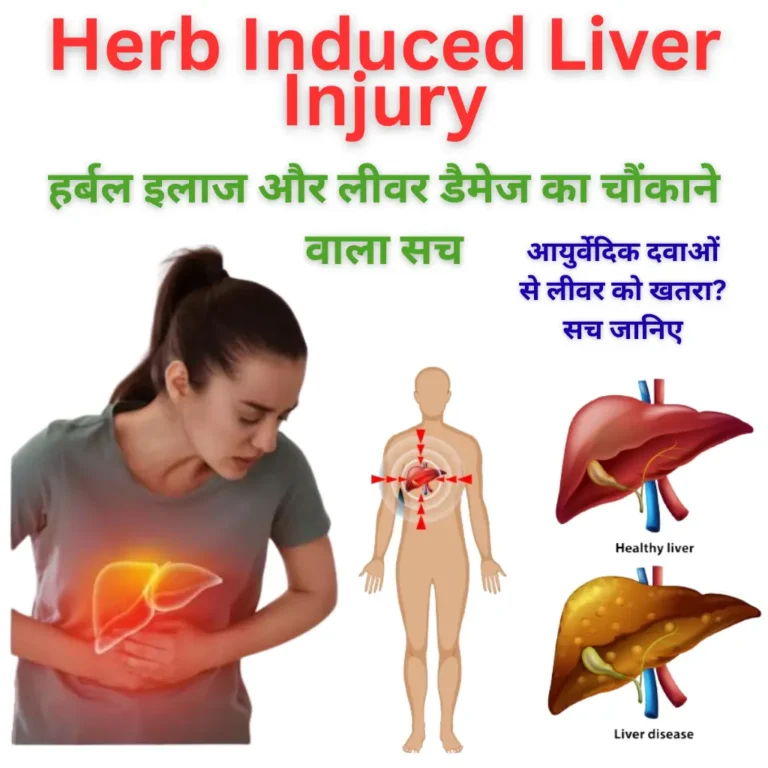Herb Induced Liver Injury: Risks & Safe Use of Ayurvedic Herbs
Ayurveda has been trusted for more than 2,000 years as a holistic healing science. Millions of people today rely on Ayurvedic herbs for immunity, digestion, skin, and overall wellness. But like any form of medicine, safe use is the key. Even natural herbs can sometimes stress the body if misused. One of the most important concerns in recent years is Herb-Induced Liver Injury (HILI).
The liver is your body’s master detox organ. It filters toxins, processes medicines, and helps in digestion. When the liver becomes overloaded or reacts negatively to certain herbs—especially in the wrong form, dose, or purity—it may result in liver injury. This doesn’t mean Ayurveda is unsafe; it means misuse, adulteration, or misunderstanding of herbs can create risks.
In this blog, we will explore:
- What herb-induced liver injury means
- Which Ayurvedic herbs may cause stress on the liver (when misused)
- Real-world case examples
- Science-backed insights
- Practical safety tips for liver-friendly Ayurveda
What is Herb-Induced Liver Injury (HILI)?
Herb-Induced Liver Injury (HILI) is liver damage that happens after consuming certain herbal medicines. It is similar to Drug-Induced Liver Injury (DILI), which occurs due to modern pharmaceuticals.
Symptoms of HILI include:
- Persistent fatigue
- Loss of appetite
- Nausea and abdominal pain
- Jaundice (yellowing of skin and eyes)
- Dark urine
The challenge is that symptoms often appear late, making it important to monitor herbs taken regularly.
Why Does Liver Injury Happen With Herbs?
-
Overdose or Long-Term Unsupervised Use
Many people think “herbs are natural, so more is better.” But high doses can overwhelm the liver.
-
Adulteration & Contamination
Some non-certified herbal powders and capsules are mixed with heavy metals (lead, mercury, arsenic) or synthetic drugs, which damage the liver.
-
Wrong Identification of Herbs
Example: Different species of Giloy (Tinospora) exist, but only Tinospora cordifolia is safe. Others may harm the liver.
-
Drug-Herb Interactions
Herbs can interact with modern medicines. For instance, Guggul may interact with statins, and Giloy with diabetes medications.
-
Pre-existing Liver Issues
People with fatty liver, hepatitis, or alcohol-related liver disease may be more sensitive to strong herbs.
Ayurvedic Herbs Linked With Liver Injury (When Misused)
-
Giloy (Tinospora cordifolia)
- Safe use: 30–60 ml juice or 500 mg capsule per day.
- Risk: Cases of liver injury reported when people consumed Tinospora crispa, a different species mistakenly sold as Giloy.
- Reality: Correct Giloy is generally safe and even liver-protective.
-
Aloe Vera (Unprocessed Latex)
- Safe use: Aloe vera gel (inner pulp) is safe for digestion and skin.
- Risk: The yellow latex just beneath the leaf skin contains anthraquinones, which are toxic for the liver.
-
Green Tea Extract (High Dose Capsules)
- Safe use: Drinking green tea daily is beneficial.
- Risk: Highly concentrated extract capsules (used for weight loss) have been linked to hepatitis and liver failure.
-
Guggul (Commiphora mukul)
- Safe use: Prescribed in Ayurveda for cholesterol and joint pain.
- Risk: Overuse or combination with certain cholesterol-lowering medicines can stress the liver.
-
Non-Certified Herbal Products
- Risk: Some powders bought from unknown vendors are adulterated with steroids, antibiotics, or metals, directly damaging the liver.
Real-World Case Studies
Case 1 – Giloy Confusion
A 45-year-old woman in Delhi consumed Giloy juice daily for 6 months. She developed jaundice and elevated liver enzymes. Later, it was found that she had been given Tinospora crispa, not Tinospora cordifolia. After stopping the juice and taking proper Ayurvedic treatment under supervision, her liver recovered within 2 months.
Case 2 – Fitness Supplement Gone Wrong
A 30-year-old man purchased “fat-burner herbal capsules” online. Within 3 weeks, he experienced nausea, abdominal pain, and dark urine. Tests revealed liver inflammation. Lab checks showed the capsules contained green tea extract + synthetic drugs. After stopping the supplement and taking supportive care, his liver normalized in 6 weeks.
Case 3 – Safe Use, Healthy Outcome
A 50-year-old diabetic man used Giloy tablets prescribed by a certified Ayurvedic doctor for immunity. He took the right dose (500 mg daily) for 3 months, with regular blood tests. His liver enzymes remained normal, and he reported improved energy.
👉 This shows that correct herb + correct dose + medical guidance = safe results.
Science Speaks: What Studies Say
- A study published in the Journal of Clinical and Experimental Hepatology (2020) reported that most cases of herb-induced liver injury in India were due to wrong plant species or contaminated formulations, not the herbs themselves.
- Research in AYU Journal (2018) highlighted that Giloy, when properly identified, is hepatoprotective, not hepatotoxic.
- WHO emphasizes the need for quality control, dose regulation, and doctor supervision in herbal medicine.
How to Safely Use Ayurvedic Herbs (Liver-Friendly Practices)
- Always follow prescribed dose. Overdose does not increase benefits.
- Buy from trusted brands (Himalaya, Dabur, Baidyanath, Patanjali, or certified local pharmacies).
- Avoid mixing herbs randomly without guidance.
- Consult your doctor if you’re already on modern medicines.
- Get liver tests (SGPT, SGOT) if taking herbs longer than 2–3 months.
- Avoid alcohol, junk food, and self-medication during herbal treatments.
- Use seasonal & short-term herbs unless prescribed for long-term therapy.
Conclusion
Ayurveda offers herbs that can heal, strengthen, and detoxify the liver—but only when used safely and correctly. Herb-Induced Liver Injury happens mainly due to wrong identification, overdose, adulteration, or unsupervised use.
The truth is, Ayurveda is not the problem—misuse is. With proper guidance, certified herbs, and respect for dosage, you can enjoy the benefits of Ayurvedic medicine while keeping your liver safe.
👉 Always consult a certified Ayurvedic practitioner and get regular health checkups when using herbs for longer durations.
Ayurvedic Doctor | 15+ Years Experience | General Physician and Panchakarma Specialist
 Dr. Dinesh Kumar is a qualified Ayurvedic doctor with over 15 years of experience in holistic physician and Panchakarma therapies. He specializes in natural treatments for skin, orthopedic, and lifestyle-related issues.
Dr. Dinesh Kumar is a qualified Ayurvedic doctor with over 15 years of experience in holistic physician and Panchakarma therapies. He specializes in natural treatments for skin, orthopedic, and lifestyle-related issues.
Clinic: Devkalp Ayurveda | Website: devkalpayurveda.com Youtube: Online Practical Tutorial
Faq
Q1. Is Ayurveda unsafe for the liver?
No. Ayurveda is safe when herbs are properly identified, used in the right dose, and sourced from trusted brands. Problems occur with misuse or contaminated products.
Q2. Which Ayurvedic herbs may cause liver injury?
Giloy (if wrong species used), unprocessed Aloe latex, and concentrated green tea extract capsules are linked with liver stress when misused.
Q3. Can I take Giloy daily?
Yes, in small doses (30–60 ml juice or 500 mg capsule) under guidance. Overdosing or using wrong species is risky.
Q4. How do I know if an herb is affecting my liver?
Watch for yellow eyes, fatigue, dark urine, nausea, or abdominal pain. If these occur, stop the herb and get liver function tests.
Q5. How to choose safe Ayurvedic products?
Always buy from trusted Ayurvedic pharmacies, check labels, and avoid unknown online supplements.
Q6. Can Ayurvedic herbs interact with modern medicines?
Yes. Herbs like Ashwagandha, Giloy, and Guggul may interact with diabetes or blood pressure medicines. Always inform your doctor.
Q7. What to do if I suspect herb-induced liver injury?
Stop the herb immediately, consult a doctor, and do liver function tests.
Q8. Are Triphala and Amla safe for the liver?
Yes, they are considered liver-protective in Ayurveda and modern studies.
Some Important Related Link
-
You can also read this Ayurvedic Remedies for Fatty Liver: Herbs, Diet & Lifestyle Tips”
-
“For related , check our article on Benefits of Walking 10,000 Steps a Day”
-
“If you want know about natural brain tonic, see our post on Natural Brain Tonic.”


